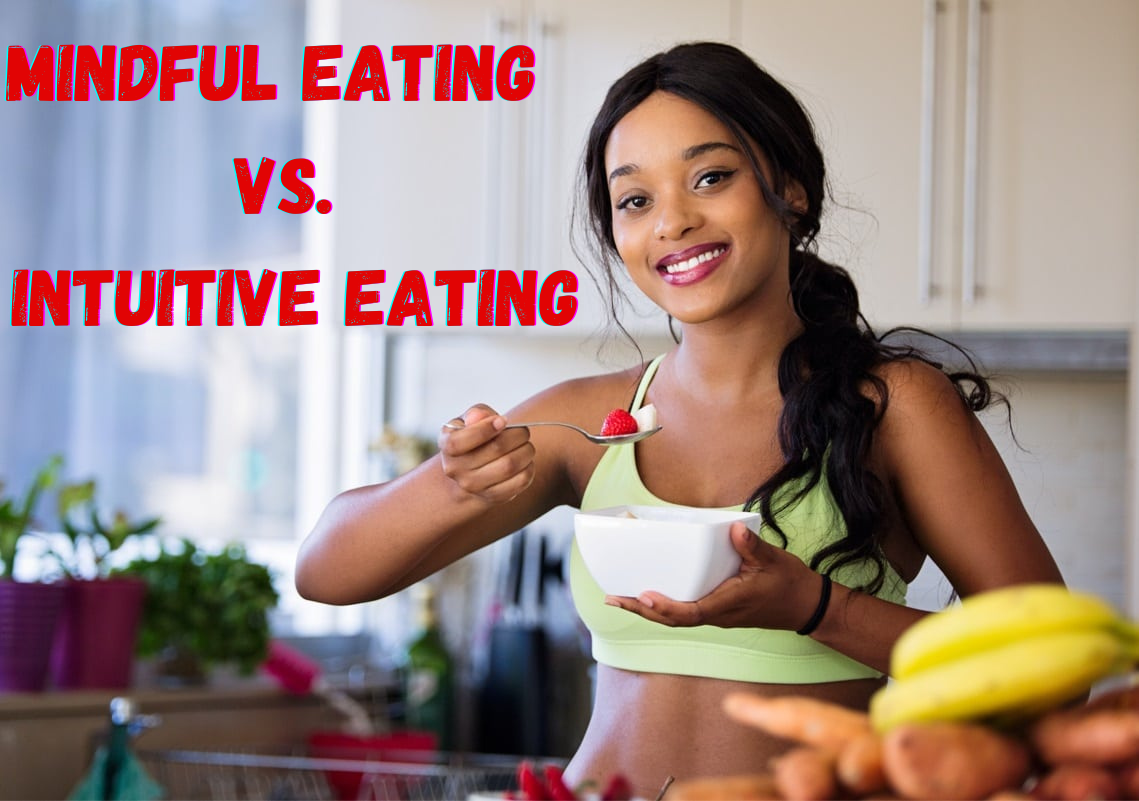Mind vs. Mouth: Mindful Eating vs. Intuitive Eating - Which One Bites Back?
In today's fast-paced world where quick meals often replace balanced diets the conversation around eating habits has never been more critical. Among the plethora of dietary advice two concepts have risen to prominence: Mindful Eating and Intuitive Eating. Both philosophies offer a departure from traditional diet-centric thinking focusing instead on a more holistic relationship with food. But which one truly offers a bite for the better?
Understanding Mindful Eating
The Essence of Mindful Eating
Mindful Eating is rooted in the broader practice of mindfulness. It emphasizes an attentive and conscious eating experience encouraging individuals to savor each bite and be fully present during meals. This approach is not just about what you eat but how you eat aiming to heighten the sensory experiences of meals and snacks.
Key Components:
Attention to Hunger and Fullness Cues: Recognizing when you are truly hungry and when you’ve had enough.
- Sensory Awareness: Paying close attention to the taste texture and aroma of your food.
- Emotional Connection: Understanding the emotional triggers that lead to overeating or choosing unhealthy foods.
Delving into Intuitive Eating
The Philosophy of Intuitive Eating
Intuitive Eating on the other hand is a self-care eating framework that distinguishes itself by promoting a healthy attitude toward food and body image. The core principle is simple: eat when you're hungry stop when you're full. It teaches you to trust your body's hunger signals and reject the diet mentality.
Core Principles Include:
- Rejecting the Diet Mentality: Abandoning the idea of "forbidden" foods and harmful dieting patterns.
- Honoring Hunger: Learning to recognize and respect your body’s hunger signals.
- Making Peace with Food: Giving yourself unconditional permission to eat.
- The Showdown: Mindful Eating vs. Intuitive Eating
Similarities and Differences
At their core both approaches advocate for a non-restrictive anti-diet philosophy towards food focusing on internal cues rather than external diet rules. However Mindful Eating places a greater emphasis on the eating experience itself encouraging a deeper connection with food through mindfulness practices. Intuitive Eating while it encompasses mindful eating practices extends its focus to include a psychological understanding of eating habits and a rejection of diet culture.
The Benefits Unveiled
For Mindful Eating:
- Improved Digestion: By eating slowly and chewing thoroughly you're aiding your digestive system.
- Enhanced Enjoyment of Food: Taking the time to really taste your food can lead to greater satisfaction from meals.
- Weight Management: It can naturally lead to weight loss as you learn to eat only until you’re satisfied.
For Intuitive Eating:
- Freedom from Dieting: This approach can break the cycle of chronic dieting and the guilt associated with eating "bad" foods.
- Better Psychological Health: It promotes body positivity and can reduce the stress and anxiety associated with eating.
- Improved Metabolic Health Indicators: Studies suggest it can lead to lower blood pressure and cholesterol levels.

How You Can Work On Your Intuitive Eating To Stay Healthier?
To delve deeper into how you can work on your Intuitive Eating to stay healthier it's crucial to understand that this journey is about reconnecting with your body's natural cues and learning to trust them. Intuitive Eating is a dynamic interplay between your mind and body emphasizing a harmonious relationship with food that transcends conventional dieting. Here's an expanded guide to nurturing this relationship and fostering a healthier lifestyle through Intuitive Eating.
1. Ditch the Diet Mentality
The first step towards Intuitive Eating is to let go of the diet mentality. This means releasing any thoughts of "good" vs. "bad" foods and the guilt often associated with eating. Recognize that diet culture has likely influenced your eating habits and perceptions about health and consciously choose to step away from those influences.
- Actionable Tip: Unfollow social media accounts or avoid publications that promote restrictive eating or unrealistic body standards. Instead seek out resources that support a balanced approach to eating.
2. Honor Your Hunger
Keeping your body biologically fed with adequate energy and carbohydrates can prevent overeating. Learn to recognize the early signs of hunger and allow yourself to eat which will build trust in your relationship with food and with yourself.
- Actionable Tip: Regularly check in with yourself throughout the day to assess your hunger levels on a scale from 1 to 10. If you find yourself getting too hungry (below a 3) it's time to eat even if it's not a traditional mealtime.
3. Make Peace with Food
Give yourself unconditional permission to eat. When you tell yourself that you can’t or shouldn’t have a specific food it can lead to intense feelings of deprivation that build into uncontrollable cravings and often bingeing.
- Actionable Tip: Allow all foods in your diet and notice how it feels to eat them without guilt. This can help reduce the "forbidden fruit" appeal of certain foods and normalize your relationship with them.
4. Challenge the Food Police
The "food police" is a term used in Intuitive Eating to describe the set of unreasonable rules that diet culture has created. It's important to silence these internalized voices that deem you "good" for eating minimal calories or "bad" for eating a piece of chocolate cake.
- Actionable Tip: When you notice yourself thinking critically about your food choices consciously challenge these thoughts. Replace them with more compassionate supportive messages that acknowledge your right to eat all foods.

5. Discover the Satisfaction Factor
In our eat-and-run massive-portion-sized culture we often overlook one of the most basic gifts of existence - the pleasure and satisfaction that can be found in the eating experience. When you eat what you really want in an environment that is inviting and conducive the pleasure you derive will be a powerful force in helping you feel satisfied and content.
- Actionable Tip: Try to make your eating experience more enjoyable by setting a pleasant table eating slowly and truly savoring each bite. Notice how this affects your satisfaction levels.
6. Feel Your Fullness
Listen to your body signals that tell you that you are no longer hungry. Observe the signs that show that you're comfortably full. Pause in the middle of eating and ask yourself how the food tastes and what your current hunger level is.
- Actionable Tip: Halfway through your meal take a moment to assess your fullness level. This practice can help you decide whether to continue eating or save the rest for later.
7. Cope with Your Emotions Without Using Food
Find ways to deal with stress and emotional eating. While food can provide comfort in the short term it won't solve the problem. If anything eating for emotional hunger will only make you feel worse in the long run.
- Actionable Tip: Develop a toolbox of non-food strategies to handle stress and emotions such as taking a walk talking with a friend journaling or practicing mindfulness or meditation.
8. Respect Your Body
Accept your body so you can feel better about who you are. It's hard to reject the diet mentality if you are unrealistic and overly critical about your body shape or size.
- Actionable Tip: Practice body positivity affirmations and surround yourself with body-positive influences. Recognize your body's capabilities and celebrate them.
Conclusion
Both Mindful Eating and Intuitive Eating offer valuable perspectives on how to cultivate a healthier more positive relationship with food. While Mindful Eating invites you to be present and fully experience your food Intuitive Eating challenges you to listen to your body and reject societal pressures around dieting.
Choosing between Mindful Eating and Intuitive Eating doesn't have to be an either/or decision. Many find a blend of both approaches works best using mindfulness to enhance their intuitive eating practices. Ultimately the best approach is the one that resonates with you personally aligns with your lifestyle and promotes a healthy sustainable relationship with food.
In the showdown between Mind vs. Mouth it's clear that neither bites back. Instead they offer paths toward a more liberated and fulfilling eating experience. Whether you lean towards Mindful Eating embrace Intuitive Eating or find your balance between the two the key takeaway is to listen to your body enjoy your food and nourish not just your physical self but your emotional and psychological well-being too. Embracing these principles can lead to a healthier happier life free from the constraints of traditional diet culture.






